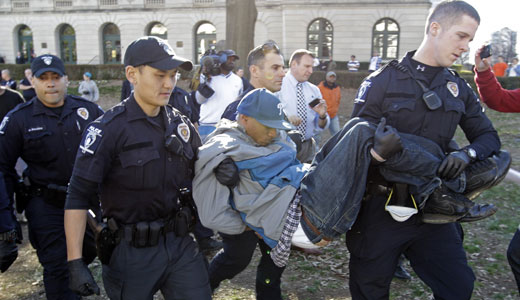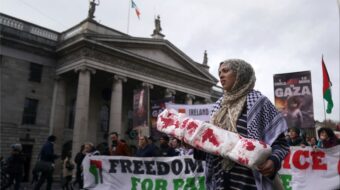
To prepare for the 2012 Democratic National Convention in Charlotte, North Carolina, lawmakers have passed a series of new ordinances and changes affecting the public’s ability to speak and assemble, as well as expanding police power. These laws have outlawed Occupy Charlotte’s camping outside of Old City Hall in downtown Charlotte. Occupy Charlotte had been camping there since Oct. 2011.
On Jan. 24, the Charlotte City Council voted ten to one to amend city code to outlaw camping on city property, and to allow for a new set of regulations during so-called “extraordinary events.” The new ordinance outlaws “camping,” defined as the use of city property for sleep, living, preparing for sleep, or storing personal belongings, on public property and hanging any attachments to public property. An extraordinary event, declared by the city manager, is defined as “a large scale special event of national or international significance and/or an event expected to attract a significant number of people to a certain portion of the city.”
When an extraordinary event is declared, it will be unlawful for civilians to possess items such as a chain, marker fluid, a backpack, etc. and prohibits civilians from wearing a mask or scarf.
At the meeting, Protesters shouted “shame!” and “evict us, we will multiply.” According to the Charlotte Observer, city officials proclaimed that under the new rules, protesters can stay on the site 24 hours a day, seven days a week, but they cannot sleep, or create any semi-permanent structures used for cooking food, sleeping, or other living arrangements.
After Charlotte passed the new ordinances, Mecklenburg County followed suit on Feb. 20 banning camping and setting up “temporary shelters,” as well as hanging banners on county property. Commissioner Bill James defended the proposed ordinance stating, “In a sense, we owe Occupy Charlotte a thank you because had they not done what they did, we wouldn’t have known that there’s a weakness in our non-park property ordinance.”
Passage of these ordinances have concerned advocates of free speech. In reference to the “extraordinary event” clause, Katy Parker, legal director of the ACLU North Carolina, told the Charlotte Observer, on Jan. 9, “To me, that looks like the cops can search your backpack for any reason. If you have no standards, it risks racial profiling, or other profiling.”
Advocates for the homeless have also expressed concern. “Estimates of the homeless population in Mecklenburg County range from 4500-7000. Have these people been consulted? I am concerned that City and County officials are trying to hide this population as we get closer to the DNC,” Charlotte resident and Occupy Charlotte supporter Scottie Wingfield remarked.
Occupy Charlotte’s attorney Ken Davies declared the new Charlotte ordinance unconstitutional, and sought a temporary restraining order against enforcement of the new ordinances. Davies wrote in the lawsuit, “Occupy Charlotte is perceived as an embarrassment to city officials who wish to present the city of Charlotte as a city free of significant controversy at the time of the Democratic National Convention.”
Scottie Wingfield wrote in an affidavit submitted to the Mecklenburg County Superior Court, that on Feb.18, “Occupy Charlotte lay down blankets to sit on for a picnic, General Assembly, discussions, and playing board games…A third tent provided covered space for people to socialize inside protected from the rain that was predicted for that evening.” According to Wingfield’s affidavit, that same day police told her she had to remove the third tent because the tent was of the type “generally used for sleeping” even though she told them the tent had no personal belongings. Wingfield described the tents as symbolic of “our desire to occupy public space until political, social, and economic changes happen in our society.”
On Mar. 1, 2012, Superior Court Judge Forrest Bridges denied Davies’ request for a temporary injunction. In an email written to Charlotte Mayor Anthony Fox and City Attorney Bob Hagemann, judge Bridges wrote, “The ordinance is not drafted nor is it being applied in a manner as to inhibit or encroach upon freedom of speech, verbal, or symbolic nor upon freedom of assembly, particularly since the Plaintiffs still have the opportunity to assemble on the site and express themselves verbally and through other peaceful means of protest seven days per week, 24 hours per day, within the parameters set by the ordinance.”
On Feb. 13, along with the new ordinances, the City council voted seven to two to eliminate the unlimited citizens’ forum that was held the first Monday of each month. Councilmen cited family time and budget reasons for the need to eliminate the forum.
In response to opposition to the proposal, City Councilman, Michael Barnes, addressed the council and attendees stating, “I understand exactly what you are talking about, but do you ask me whether my time with my children is more valuable than putting up with some of the crap I hear out of people up here? Absolutely. I’d rather be at home.”
Gina Cerniglia, Charlotte resident, remarked, “By eliminating the unlimited speakers at the Citizens Forum, Charlotte city council has made it clear that they are not interested in the public’s opinion. How can we be properly represented when our own city council won’t even listen to their constituents?”
Photo: Police arrest a member of Occupy Charlotte as they remove tents belonging to the group. Chuck Burton/AP












Comments